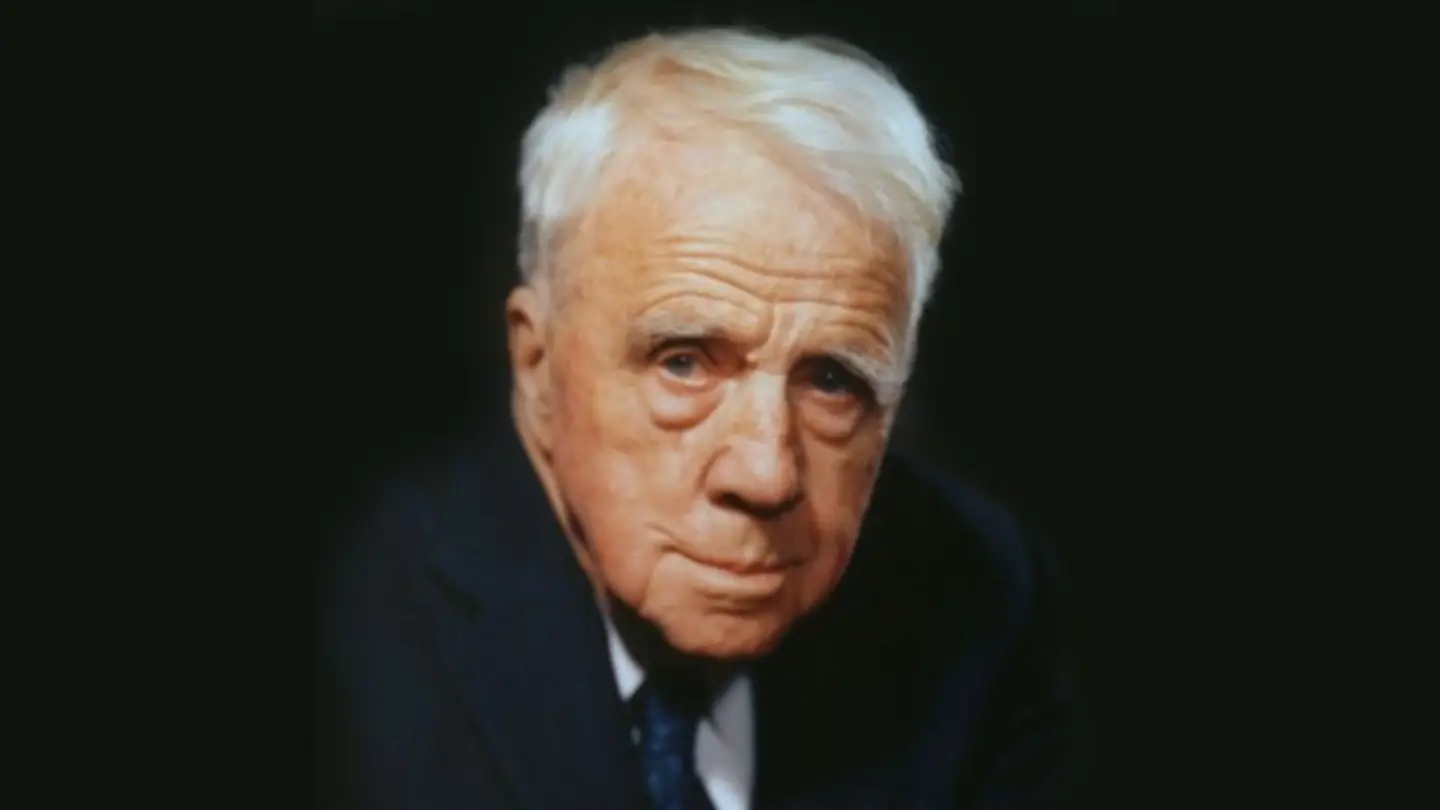Robert Lee Frost (1874-1963) is one of America’s most celebrated poets, known for his deep explorations of rural life, human emotions, and the complexities of existence. His poetry, often deceptively simple, reflects the struggles, beauty, and contradictions found in nature and human relationships. Throughout his life, Frost stayed rooted in the New England landscape, which provided the backdrop for much of his work. A four-time Pulitzer Prize winner, Frost’s ability to capture the essence of American life through colloquial language and traditional verse has cemented his place as a literary giant.
Early Life and Influences
Born on March 26, 1874, in San Francisco, California, Robert Frost spent the first 11 years of his life on the West Coast. After his father’s death in 1885, his family moved to Massachusetts, where Frost found a connection to the rural landscapes that would later become central to his poetry. He attended Dartmouth College briefly before returning home to work at various jobs, including teaching and farming, but he always aspired to be a poet.
In 1894, Frost published his first poem, “My Butterfly: An Elegy,” in a New York magazine, which gave him a sense of validation in his pursuit of a literary career. After marrying Elinor Miriam White in 1895, Frost continued to struggle financially, balancing his duties as a farmer and teacher while writing poetry in his spare time. His life was marked by personal hardships, including the deaths of several of his children and the ongoing mental illness of his wife, events that deeply influenced his later works.
Literary Career and Major Works: A Timeline
1910s
Robert Frost’s first major success came after a bold decision to move to England in 1912. While there, he met several influential poets, including Ezra Pound, who helped him get his first book of poems published. England proved to be a turning point for Frost, providing him with the recognition and encouragement he needed to establish his voice as a poet.
1913: A Boy’s Will
Frost’s first published collection, A Boy’s Will, came out in 1913 in England. This collection reflects the development of his poetic identity, focusing on themes of youth, nature, and rural life. While not as mature as his later works, A Boy’s Will displays Frost’s love for simple language and his skill at blending personal reflection with universal themes.
1914: North of Boston
The following year, Frost published North of Boston, a collection that would solidify his reputation as a poet of immense talent. This book contains some of his most famous dramatic monologues and narrative poems, including “Mending Wall” and “The Death of the Hired Man.” In these poems, Frost delves into the intricacies of human relationships, often using rural life as a metaphor for broader philosophical issues.
Popular Verses from North of Boston
From “Mending Wall”:
“Good fences make good neighbors.”
This iconic line from Mending Wall has become synonymous with Frost’s exploration of boundaries—both literal and metaphorical—and the complex balance between individuality and community.
1920s
The 1920s marked Frost’s return to the United States, where he continued to write and teach at various universities, including Amherst College and Harvard. His poetry during this time expanded on themes of isolation, nature, and existential contemplation.
1923: New Hampshire
Frost’s New Hampshire was published in 1923 and won him his first Pulitzer Prize. This collection showcases the rich New England landscape and includes the famous poem “Stopping by Woods on a Snowy Evening,” one of the most beloved and widely quoted poems in American literature.
Popular Verses from “Stopping by Woods on a Snowy Evening”:
“The woods are lovely, dark and deep,
But I have promises to keep,
And miles to go before I sleep,
And miles to go before I sleep.”
This simple yet profound verse captures the tension between the allure of rest and the responsibilities that keep one moving forward, a common theme in Frost’s work.
1930s-1940s: Continued Success and Recognition
During the 1930s and 1940s, Robert Frost continued to write and publish widely, earning more accolades and expanding his reputation as a quintessentially American poet. He won three additional Pulitzer Prizes for his collections Collected Poems (1931), A Further Range (1936), and A Witness Tree (1943). His work during these years remained focused on human nature, solitude, and the beauty of rural life.
Popular Verses from A Witness Tree:
From “The Gift Outright”:
“The land was ours before we were the land’s.”
This opening line from The Gift Outright explores the relationship between people and the land they inhabit, a recurring theme in Frost’s work. The poem was later recited by Frost at the inauguration of President John F. Kennedy in 1961, marking a significant moment in both literary and political history.
Themes and Style
Robert Frost’s poetry is often characterized by its use of traditional meter and rhyme schemes, contrasting with the modernist free verse that dominated much of 20th-century poetry. He embraced the formal structures of sonnets, blank verse, and narrative poems, while infusing them with conversational language and colloquial speech. Frost’s themes frequently revolve around nature, isolation, human relationships, and the passage of time. His rural settings are used as metaphors for universal truths, making his work both regionally grounded and widely relatable.
Despite his pastoral imagery, Frost’s poetry often conveys a sense of underlying tension, as seen in poems like “The Road Not Taken” and “Acquainted with the Night,” where decisions, isolation, and existential contemplation take center stage.
Final Years and Death
Robert Frost remained active as a poet and teacher well into his later years. He was awarded numerous honors, including a Congressional Gold Medal in 1960 and a position as Poet Laureate of Vermont. His final years were marked by personal tragedies, including the deaths of several of his children and his wife. Frost died on January 29, 1963, at the age of 88.
Frost’s Enduring Legacy
Robert Frost’s poetry continues to resonate with readers due to its accessibility, philosophical depth, and lyrical beauty. His ability to combine traditional forms with modern themes has kept his work relevant in contemporary literary discussions. Frost’s exploration of the human condition through the lens of rural New England remains one of the most enduring and beloved aspects of American literature.
Timeline of Major Works:
- 1913: A Boy’s Will
- 1914: North of Boston
- 1923: New Hampshire (Pulitzer Prize)
- 1931: Collected Poems (Pulitzer Prize)
- 1936: A Further Range (Pulitzer Prize)
- 1943: A Witness Tree (Pulitzer Prize)
Robert Frost’s work endures as a testament to the complexities of human existence, rendered in beautiful, often deceptively simple verse. His poetry continues to be studied and cherished for its deep wisdom, evocative imagery, and timeless appeal.



